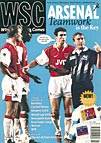 Newcastle's lacklustre media response to "Toongate" was part of Shepherd and Hall's downfall, argues Matthew Roche
Newcastle's lacklustre media response to "Toongate" was part of Shepherd and Hall's downfall, argues Matthew Roche
For all the wrong reasons, Toongate may prove to be something of a welcome watershed in relations between major clubs on the one hand and the press and public on the other. More interesting than why Murdoch’s machine targetted Newcastle was the ruthless way in which the operation was carried out. This was not Barnsley, Coventry or Leicester, but a powerful sporting empire. The message was clear: whoever you are, we can bring you down.
Club chairmen with any sense will have been taking some very detailed notes as Toongate unfolded. The first lesson is clear – when disaster strikes, what you need above all else is a press team which has built up excellent relations with the media that can be used to ward off the first blow. Banning or snubbing reporters you don’t like may be satisfying at the time but will come back to haunt you. You also need a press team which knows what it’s doing. A counter-offensive that first Sunday from Shepherd and Hall would have helped spike Murdoch’s guns, because as stories go, “Newcastle duo deny charges” hardly stirs the blood. Instead, we had reams of “Newcastle United remain silent as pressure grows” headlines. “As pressure grows” is one of the classic ways of keeping a story going, up there with “X was today calm but tense” the day after unrest in a far-off hotspot. The fact that the editor of the main local newspaper immediately called for Shepherd and Hall to resign says all we need to know about the state of Newcastle’s ties with the press.
And if you take a look at the way the story developed, the need for a firm early rebuttal and sympathetic “Southerners plot to overthrow Newcastle heroes” stories becomes even clearer. “What none of the journalists involved could have anticipated was the astonishing way it took off,” wrote a commentator in the Independent, betraying lamentable ignorance of how the British media works. The best-selling Sunday newspaper breaks a big story. The next day the biggest tabloid and one of the most respected broadsheets – both in the same media empire – pour petrol onto the bonfire. Newspapers set much of the news agenda so it’s clear which way the radio and television coverage is heading. Just in case the message doesn’t get through, the story is thrust to the fore by Murdoch’s Sky News, which although relatively bereft of subscribers is closely followed by domestic news editors.
And what do other media outlets do when faced with such a band-wagon? As the old ads went, no one was ever sacked for buying an IBM, and no news editor here is ever sacked for taking the same angle as the rest. In fact, it would have been more astonishing had the story not taken off.
Newcastle also suffered from the media’s endemic laziness. Why bother checking something if it looks and sounds good? We heard an awful lot about the local polls which showed the “vast majority” of fans wanted the terrible two to resign. But who carried out these polls? On what date and at what time of day were they conducted? How many people were asked and where were they asked? Surveys are pretty useless unless this kind of information is available. And were the shocked fans we heard from so volubly any more representative than the spectacularly telegenic weeping teeth-gnashers who so bewailed Keegan’s departure and the failure to win the 1995-96 title?
But even if Toongate was launched for all the wrong reasons, I for one would cheer if it led to a closer investigation of the many insulting ways clubs treat their fans and the press. Much is made of the widely-held belief that replica shirts are a rip-off, so why don’t the clubs simply tell us the profit margins? There are some Premier League stadia where anyone over five-foot-ten cannot sit down without great difficulty in even the most expensive areas. The sight of highly-paid players setting up a pool every time they get within sniffing distance of Wembley and demanding money for interviews is little short of disgusting. When Gascoigne held his first training session at Middlesbrough, press photographers were banned for fear that he might fail his medical. Fair enough – but did the club really think it was making any friends by subsequently offering its own photos of the session for £1,000?
Without the media and the long-suffering public, football would be dead. So let’s have a little more respect and cooperation in future.
From WSC 135 May 1998. What was happening this month